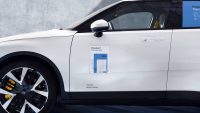Supply chain problems hitting new car sales have contributed to a sharp slowdown in UK economic growth, latest official figures show.
As Britain tries to recover from the economic fall-out of the pandemic, the Office for National Statistics (ONS) said today (Nov 11) the economy expanded by just 1.3 per cent between July and September – down from growth of 5.5 per cent in the previous three months.
It added that growth picked up in September to a better-than-expected 0.6 per cent but revisions showed the performance in July and August was worse than originally thought, with evidence that the global supply chain issues were taking their toll.
There was a 0.2 per cent contraction in July, versus the 0.1 per cent fall previously estimated, while August showed growth of 0.2 per cent, against the 0.4 per cent initial reading.
New car sales have been particularly hit by a shortage of semiconductor chips and continue to be affected – they were down by nearly a quarter in October.
The latest ONS figures show further evidence of supply chain strain on the UK economy, with car production, renting and leasing hit by the shortage of new cars throughout the quarter, while construction was also knocked in July and August.
Overall, growth in the trade and repair of motor vehicles sector was down 13.7 per cent in September, compared with pre-pandemic levels in February.
The figures also revealed a 2.9 per cent jump in fuel sales by volume in September amid panic-buying on forecourts caused by some petrol station closures because of driver shortages.
Meanwhile, construction projects were delayed because of difficulties in getting materials, said the ONS.
GDP grew 0.6% in September but remains 0.6% below its pre-pandemic level:
▪️ services grew 0.7% (0.3% below) ▪️ manufacturing fell 0.1% (2.5% below) ▪️ construction grew 1.3% (1.0% below)
➡️ https://t.co/HuuEBG5Lw9 pic.twitter.com/56EYhgVpc1
— Office for National Statistics (ONS) (@ONS) November 11, 2021
The third-quarter result means the economy is now 2.1 per cent below where it was before the pandemic struck.
On a month-by-month basis, the economy in September was 0.6 per cent below pre-pandemic levels seen in February 2020.
Grant Fitzner, chief economist at the ONS, said: ‘Growth picked up in September and the UK economy is now only slightly below pre-pandemic levels.
‘This latest increase was led by the health sector, boosted by more visits to GP surgeries in England. Lawyers also had a busy month as house-buyers rushed to complete purchases before the end of the stamp duty holiday.
‘However, these were partially offset by falls in both the manufacture and sale of cars.
‘Notably, business investment remained well down on pre-pandemic levels in the three months to September.’
The growth slowdown raises the threat of so-called ‘stagflation’ – slowing growth combined with rising inflation – as the cost of living rockets higher, with soaring energy and fuel costs adding to price increases owing to supply issues.
Meanwhile, the Bank of England has warned that inflation will jump from 3.1 per cent to 4.5 per cent by November and hit around five per cent next April – the highest level for a decade.



































